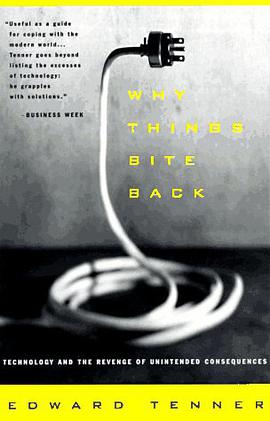Why Things Bite Back
豆瓣
Technology and the Revenge of Unintended Consequences
Edward Tenner
简介
Technology has made us healthier and wealthier, but we aren't necessarily happier in our zealously engineered surroundings. Edward Tenner is a connoisseur of what he calls "revenge effects" - the unintended, ironic consequences of the mechanical, chemical, biological, and medical forms of ingenuity that have been hallmarks of the progressive, improvement-obsessed twentieth century. In seeking out these revenge effects, he ranges far and wide in our cultural landscape to discover an insistent pattern of paradox that implicates everything from black lung to bluebirds, wooden tennis rackets to Windows 95. His insatiable curiosity embraces technology in all its guises: televised competitive skiing, which is much less exciting now that state-of-the-art cameras have eliminated the blur and lost motion of older broadcasts; low-tar cigarettes, which may encourage smokers to defer quitting altogether; justified margins, which became de rigueur just as psychologists and typographers were realizing that uneven right-hand edges are both more legible and more attractive; the meltdown at Chernobyl, which occurred during a test of enhanced safety procedures; and much, much more. While Tenner is fascinated by these phenomena in their own right, Why Things Bite Back is not merely a compendium of technological perversities. There is a historical and, indeed, ethical agenda behind his "new look at the obvious." After all, Murphy's Law as originally uttered by a frustrated military engineer was meant not as a fatalistic, defeatist principle but as a call for alertness and adaptation. Tenner heartily concurs. Things do go wrong, with a vengeance, and assigning cause can be as tricky as unscrambling an egg.Reducing revenge effects demands substituting brains for stuff - deintensifying our quest for more, better, faster, in favor of finesse. And in Tenner's estimation, humanity is perfectly capable of this adjustment.


